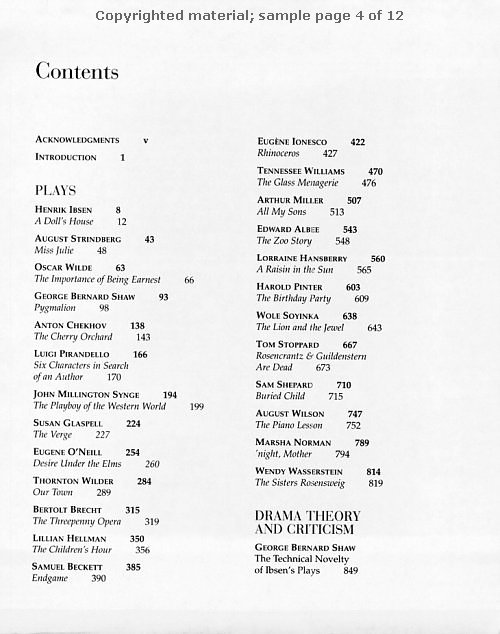[ advertising space : webmaster ]

Theory of Spectatorship

script.vtheatre.net

ShowCases: 3 Sisters, Mikado, 12th Night, Hamlet, The Importance of Being Earnest, Dangerous Liaisons, Don Juan
prof. Anatoly Antohin Theatre UAF AK 99775 USA


my eGroups

Script Analysis Directory & DramLit
Linksleft frame
Featured Pages: See Online Plays listing!

SHOWS: 12th Night
NEW: 2005: total directing & total acting
* March 2006: Go.dot -- 100 years since Sam Beckett's birth * THR413 Playscript Analysis (Fall)
Summary
 Anton Chekhov
Anton Chekhov
* 3 Sisters: showcase *
* Uncle Vanya
* Cherry Orchard
* Seagull
* one-acts
The Playwright's Guidebook: An Insightful Primer on the Art of Dramatic Writing During the ten years that Stuart Spencer has taught playwriting, he has struggled to find an effective playwriting handbook for his courses. Although most of the currently popular handbooks have good ideas in them, they all suffer from the same problems: they're poorly organized; are composed mostly of quirky, idiosyncratic advice on how specific playwrights have gone about writing their own work; and are full of abstract theorizing on the nature of art. As a result, they fail to offer any concrete information on how to construct a well-written play or any useful guidelines and exercises. Moreover, few of these books are actually written by working playwrights. Out of frustration, Spencer wrote his own book. The result, The Playwright's Guidebook, is a clear, concise, and engaging handbook. Spencer addresses the important principles of structure, includes insightful writing exercises that build upon one another, explores the creative process, and troubleshoots recurrent problems that playwrights actually face.

2004 & After
Questions
The Elements of Playwriting For those interested in learning and honing the art and craft of creative playwriting! With an infectious enthusiasm for the theater, Catron presents the basic principles of playwriting, including plot, dialogue, and character development, as well as the more complex issues of creating multi-dimensional characters and writing stageworthy plays that will attract producers, directors, actors, and audiences. Throughout, he sprinkles examples from classical and modern plays, provides exercises for sharpening and developing skills, and offers practical guidelines on working with actors and directors, getting produced and published, and finding an agent. Favoring concrete advice over theory, The Elements of Playwriting is an invaluable resource for both beginning and advanced playwrights and for anyone involved in the art and craft of theater. Special features: 1) provides step-by-step techniques for improving a play; 2) includes information about copyright, agents, organizations, and references; and 3) offers end-of-chapter exercises for fine-tuning creative application of topics discussed.

^ The Shrew Film Directing "showcase" ^
Notes
«Народ, как дети, требует занимательности, действия... Смех, жалость и ужас суть три струны нашего воображения, потрясаемые драматическим волшебством».
The Possessed 2003
How to Write? Don't miss -- 2005 THR215 Dramatic Literature: new Williams Pages = The Glass Menagerie ("Seven Scenes").















